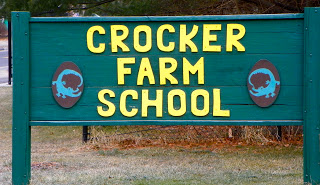GREEN LIGHT FOR CROCKER FARM EXPANSION STUDY

The Amherst School Committee on September 17 gave the green light for the Crocker Farm Expansion Study to move forward, voting unanimously to endorse a proposed timeline that would see preparations begin this month and would finish with a published study by March 2020. The $40,000 funding for the study had been included in the Fiscal Year 2020 capital budget.
Superintendent Michael Morris reminded the Committee that expanding Crocker Farm was one of the ways he presented in January, 2019 “to get to a 600-student school.” Consolidating Wildwood and Fort River elementary schools into one building of no more than 600 students, which is the framework proposed to the Massachusetts School Building Authority (MSBA), would require that approximately 150 students be moved, either to the Middle School or to Crocker Farm. According to Morris, the MSBA had said it would be advisable to have such a study done before the Enrollment Period which, if the application is successful, would be 90 days after being invited into the process in December, hence why the current Crocker Farm study is slated to be completed by March.
Town Procurement Officer Anthony Delaney presented a draft timeline and process for the study which states that “the Request for Qualifications (RFQ) will be developed by School and Town staff,” “qualifications will be evaluated by a small group chosen by the Town Manager,” and “the selected designer will be managed by School staff.” The study originated with two resident petitioners: this reporter and Maria Kopicki using the town’s “resident capital request process.” It is unclear if the petitioners will be included in the process moving forward.
Committee member Allison McDonald asked Morris when an “advisory group” would be convened for the study. Morris replied that the Town Manager would decide who would evaluate the designers, and noted that in another school project, the Regional Master Facilities Use Study, “the community got involved after the contract was awarded.” Committee Member Kerry Spitzer said “that seems kind of late to get the community involved.”
Immediately prior to the discussion of the Crocker Farm Expansion Study, the School Committee discussed an agenda item entitled “How to approach the capital requests process.” The discussion focused on the resident capital request process and how, according to Committee Chair Anastasia Ordonez, “it makes us seem out of touch.” Ordonez suggested assigning one member of the School Committee “to serve as regular liaison with the Town to keep us apprised of requests like these in the future,” and appointed Committee member Eric Nakajima to take on the role in an official capacity. (Nakajima and McDonald currently sit on the Joint Capital Planning Committee [JCPC], the committee that heard all capital requests in the spring, including resident capital requests.)
“There’s a reason why we sequenced the agenda as we did with the capital request process first, and then this item (the Crocker Farm study) to highlight it. In the best of circumstances, this would have been something the School Committee initiated,” said Ordonez.
Some Committee members said they were somewhat uncomfortable because this was the first time a resident-generated capital proposal had come before them. “The discomfort we may be feeling around this is perfectly reasonable,” said School Committee and JCPC member Eric Nakajima. “Yes, it does feel a little weird because we’re in a new process,” added Committee member Peter Demling.
Demling, despite expressing his personal view that he “didn’t see the urgency in getting this done,” urged the Committee to express a preference on whether or not to do the study. “If we don’t express the School Committee’s opinion tonight, this process is not going to happen. One way or another we ought to express our informal view on it,” he said.
The Committee voted unanimously to “endorse the draft timeline and proposed process for the Crocker Farm Expansion feasibility study,” with Nakajima adding the provision that “the School Committee encourages the Superintendent and Town Manager to work with the Committee to encourage expansive community engagement throughout this process as early as is feasible.”
